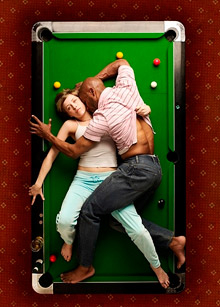Frantic Assembly's Scott Graham chats about Othello

Did you feel any trepidation about adapting such a classic play?
The first thing I did was write the whole play in the voices I recognised from those scary pubs from a nearly misspent youth. I would paraphrase and wrestle with meaning. I wanted to find a way in which I could be assured these words would remain visceral and immediate and have a contemporary relevance. This butchering was just a process I had to go through to get myself to the heart of the play. It was never in my mind that we would not use the existing text. It also helped inspire a real love of the text.
How does it feel to be rehearsing Othello with a new company, 6 years on from the first run? And is this production the same?
It feels brilliant. It is opportunities like this that show us how much we have learnt. I am six years older and should be six years better! This is more than a retour. With Othello I am taking this as an opportunity to engage with a mostly new cast and get deeper into this world. It feels fresh and exciting. I am buzzing about the potential of this production. We are not easing people into the steps of the original actors. Everything is up for grabs here. This has to be a step forward. I am not interested in standing still or stepping backwards.
What lead you to decide to give the production its urban setting? Why a pub in particular?
The pub acts as a microcosm of a structured society regulated by strict social status. It echoes the military setting of Othello. Pubs might look like a room where everyone is free to mingle and sit wherever but there are certain pubs where that freedom is not afforded. People tend to graduate from area to area. You have to earn the confidence and the acceptance that allows you to dominate the pool room or take up most of the bar. One sweep of a pub will tell you all you need to know about the rank and status of those within.
Do you think that the riots of the last few years will affect the preconceptions and reactions of audiences, particularly in London?
I am not sure it will affect them as much as the memory of how they broke up with their last girlfriend or the last argument they had with their partner. By that I mean I think of Othello as a domestic play, about relationships. It is about love and the withholding of love. I think what I am trying to say is that I feel it is the personal that will connect with and chime with an audience and not so much the social commentary. Shakespeare’s Othello is not a history play about the tensions between Turks and the people of Venice.
What do you hope an audience will take away with them after watching Othello? How do you think they will feel leaving the theatre?
The audience should be driven by the energy of the production. This comes from the marriage of text, movement and the music of Hybrid. Their music is the perfect blend of gritty, powerful beats and orchestral strings. Even the concept of their music and their perfectly apt name captures my ambition for this production.
Othello is at the Lowry from 18 – 29 November










